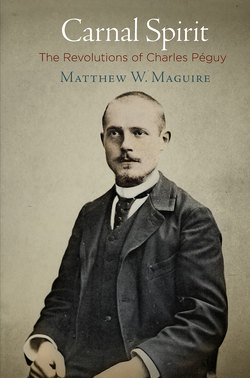Читать книгу Carnal Spirit - Matthew W. Maguire - Страница 8
На сайте Литреса книга снята с продажи.
ОглавлениеCHAPTER 2
His Youth
Before Renan and Durkheim, before the Sorbonne and Alfred Dreyfus and Henri Bergson, there was the Loire. It runs both through Orléans and through Péguy’s life. One of Péguy’s early pseudonyms was “Pierre Deloire,” and there is in his writing about the river and its surroundings a palpable sense that the river expresses many of the qualities Péguy hoped would become his own. His Loire runs through “the large and intelligent and liberal valley of courtliness and of nobility, of ceremony and festival, the valley of pavanes and of a perfectly intelligent goodness … the river [is] not only royal, but kingly, the majestic river, but majestic with a politeness, an ease, with inimitable contours … it lingers only to look at the most beautiful province in the world.”1
Charles Péguy was born steps from the Loire’s banks in early January 1873—the same week as Thérèse de Lisieux. Many prominent modernists and intellectual innovators of the early twentieth century were born just before or after him. Marcel Proust, Serge Diaghilev, and Bertrand Russell were born in the two years before Péguy; by the end of 1874, they would be joined by Karl Kraus, Hugo von Hofmannsthal, the philosopher Max Scheler, and Gertrude Stein.
In comparison to his philosophical and artistic contemporaries, Péguy had very modest origins. He was born in a neighborhood of small, low houses in the faubourg Bourgogne in Orléans, often inhabited by traditional artisans,2 dotted with small flower boxes leaning outward from the sills of the front windows.3 His father had been in poor health following his service in the Franco-Prussian War of 1870, and he died before his son’s first birthday. Péguy was raised by two women—his mother and his grandmother—who earned their living by mending chairs.
Both women worked harrowing hours: Péguy’s mother for sixteen hours a day,4 beginning at four in the morning.5 His grandmother worked alongside her and told Péguy old peasant stories, folktales among them, including tales about the damned.6 The vivacity of her telling gave him a lasting memory of what she said. Péguy was struck by the fact that he had learned his mother tongue from a peasant grandmother who could neither read nor write.7 He later wrote of how a past of “unlettered souls” in a culture were like a “reserve,” an “immense ocean,” and a “secret treasure.”8
His childhood offered Péguy a sort of security, since his mother earned a limited but steady income from her work, one that allowed her to buy some small buildings in the neighborhood. The work left little time for sentiment, however: Henri Roy, a friend and future minister of the Third Republic, wrote of Péguy’s boyhood as one “without joy … between these two women for whom gestures of affection were a forbidden weakness, and for that matter, wasted time.”9
Péguy earned excellent grades at school, even as he began to work at home, helping his mother with her chairs. In his circumstances, it would not have been surprising for him to finish an impressive if resolutely local education and become a grammar school teacher, and it seemed that without unforeseen intervention he would have done precisely that.
Péguy’s prospects may seem surprising. But they were not out of place in late nineteenth-century France. For all its meritocratic ambitions, lycée education in the early Third Republic was generally reserved for children from families far wealthier and more socially established than Péguy’s own. Less than 3 percent of French boys attended a lycée. Nor would educational and social mobility improve before the Great War: the number of students entering secondary schools in France actually dropped in the years between 1880 and 1914.10
In these circumstances, Péguy was, in social terms, an unlikely candidate for an elite education. Yet the principal of the local école normale, Théophile Naudy, thought his abilities required such an education, insisting that Péguy take Latin and enter the Lycée d’Orléans with the help of a scholarship.11
For Péguy, this was a wonder, and to begin learning Latin was “the opening of a whole world.” For “the grammarian who, one day, for the first time, opened the Latin grammar to the declension of rosa, rosae, never knew what beds of flowers he opened in the soul of the child.”12 This ancient language opened up the world to Péguy in a new way, at once deeply, numinously ancient and surprisingly alive. He would later come to read German fluently as well, but never spoke of his enchantment with German as he did with Latin.13
Many of Péguy’s generation—those whose names would be remembered in the foremost ranks of modernism or social-scientific innovation—experienced a nineteenth-century classical education differently. It was part of an expected social, cultural, and familial inheritance, sometimes a musty or even an oppressive one in need of transformation in order for it to have new meanings divorced from its recent past. For Péguy, the opening to the world of the classics was an unexpected, invaluable, and unlikely gift. He would later say of Naudy that he was “the man to whom I owe the most in the world.”14
